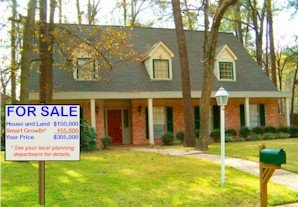The American Dream Coalition, a think tank funded by Dulles-area developer Chris Walker, has published a paper, “The Planning Penalty: How Smart Growth Makes Housing Unaffordable.”
The starting premise of this report is that the price of the house pictured above can vary region by region by as much as a factor of eight. The four-bedroom home, which sold for $150,000 in Houston recently, would cost as much as $300,000 in Portland, Ore., $600,000 in Boulder, Colo., and $1.2 million in San Jose. Some of that difference can be accounted for by demand — some localities are simply more desirable places to live. But most of the difference, argues the report, can be explained by restrictions on housing supply associated with “growth management.”
What author Randal O’Toole calls the “planning penalty” can amount to hundreds of thousands of dollars per dwelling. Writes O’Toole: “Between 1999 and 2005, regions with growth-management planning saw prices grow by 4 to 11 percent per year, while regions without such planning saw prices grow at only 1 to 3 percent per year.”
Northern Virginia and increasingly Hampton Roads, it seems, have devised the worst of both worlds. Segregation of land uses, low densities and beggar-thy-neighbor planning by local governments has created both high-cost housing and traffic congestion. Congratulations, guys!
The solution is not giving more power to local governments. It is not social engineering. What we need is a market-based solution that honors consumer sovereignty — homeowners would be free to live where they want and in the kinds of community they want — with the proviso that people pay the locational costs associated with their choices.
The challenge for Virginia is to revamp funding mechanisms for roads, utilities and public services in order to create a locationally level playing field, and to give developers more freedom to innovate new types of communities that address housing affordability and traffic congestion in creative ways. Rather than micro-manage growth, planners should define the “Balanced Communities” and “Clear Edges” (see Ed Risse’s writings for details), which provide the broad parameters within which free markets would function.


Leave a Reply
You must be logged in to post a comment.